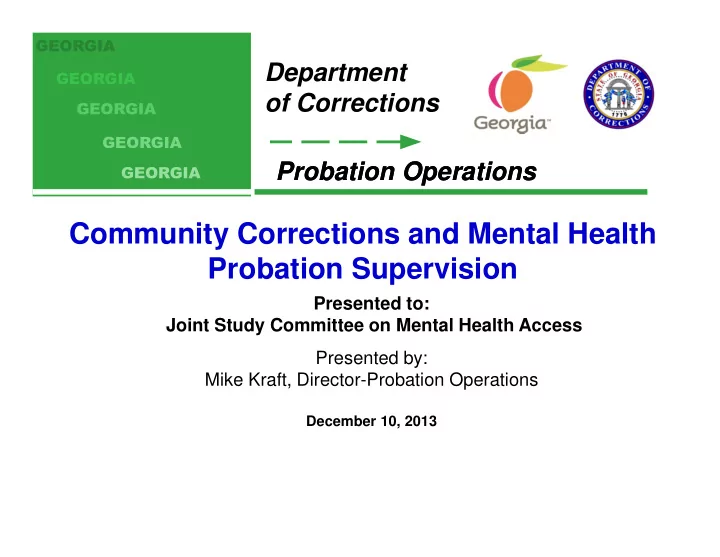

������� Department ������� of Corrections ������� ������� ������� Probation Operations Probation Operations Community Corrections and Mental Health Probation Supervision Presented to: Joint Study Committee on Mental Health Access Presented by: Mike Kraft, Director-Probation Operations December 10, 2013
Georgia Probation Population 170,000 10-year Growth (2002-2012) 160,000 29%! 150,000 140,000 130,000 120,000 Private Probation: Misdemeanors Law Passed 110,000 100,000 90,000 1984 1985 1986 1987 1988 1989 1990 1991 1992 1993 1994 1995 1996 1997 1998 1999 2000 2001 2002 2003 2004 2005 2006 2007 2008 2009 2010 2011 2012
Probation Operations
Probation Operations Initiatives Integrated Treatment Program (ITP) � Unsuccessful in the community � Enhanced services in a residential treatment setting � Co-occurring / dual diagnosis (Mental Health and Substance Abuse) Mental Health Probation Officer Specialist � Probationers with Mental Health or co-occurring diagnosis � Collaborate with local service providers � Treatment and services in the community � Eliminate incarceration costs
Integrated Treatment Facility Referral candidates � Failed at the Day Reporting Center (DRC) and have a dual diagnosis � Failed in Mental Health (MH) Court or Drug Court and have a dual diagnosis � Current or previous Mental Health/Substance Abuse (dual diagnosis) � History of MH treatment in prison or Probation Detention Center (PDC) � Targeted population are those probationers with mental health and substance treatment needs (co–occurring diagnosis)
Admission Process for ITP Screening and Evaluation — Clinical Assessment completed by Mental Health Professional � CSB � Mental Health Court � GDCs MH Counselor — Screening is done prior to sentencing (revocation hearing) Placement � Determined by a team (staffing) � Chief Probation Officer � Mental Health PO Specialist � Mental Health Counselor Mental Health — No specified length of stay or location specified in the Court Order — Duration: Until Program Completion ( 9 month program ) — Judicial Updates while in the facility
Re-entry and Aftercare Requires the Mental Health PO Specialist to visit probationer prior to release from ITP Smooth handoff from ITP back to the Circuit — Transportation of probationers being released from Appling or West Central–determine best practices Probation Officer � GDC transportation � Family � Return to Mental Health and/or Drug Courts program (if referred by MH or SA Court) — Compliance Court-Judicial Oversight Requires home visit within 24 hours of release
Mental Health Probation Officer Specialist MHPOS Caseload Criteria � Caseload maximum = 40 � ITP releases (Aftercare) 6 months � Level III re-entry (Have had inpatient treatment) / Split Cases � DRC Mental Health Aftercare � Specialty Court (Mental Health Court) aftercare � Existing caseloads that meet criteria
Mental Health Population Challenges Communication � Internal and External � Collaboration with shared information Medication � Released with 30 day supply (is this enough?) � Medication runs out before appointments Resources / Assistance � Employment � Improve skills � Partner with potential employers � Disability � Improve process / wait time � Housing � Long waiting list � Transportation � Education
Mental Health Population Challenges Training � Improve data collections � Proper documentation � How to handle Crisis situations � Provide more trainings with scenarios � Critical Incident Training for current officers and in basic training Sanctions � How to handle and address violations � Failure/refusal to take medications � Failure to attend treatment classes � Continued drug use � Develop Matrix for sanctions
Mental Health Statistics Probationer Diagnosis Classification – male and female Diagnosis Males (%) Females (%) Total (%) ADHD 210 (3.3%) 143 (4.0%) 353(3.6%) Bipolar Disorder 682 (10.8%) 568 (15.8%) 1250 (12.6%) Anxiety 705 (11.1%) 587 (16.4%) 1292 (13.0%) Depression 2298 (36.2%) 1385 (38.6%) 3683 (37.1%) Schizophrenia/ 1200 (18.9%) 268 (7.5%) 1468 (14.8%) Psychotic PTSD 489 (7.9%) 442 (12.3%) 940 (9.5%) Other 484 (7.6%) 159 (4.4%) 643 (6.5%) Learning 263 (4.2%) 37 (1.0%) 300 (3.0%) Disorders
Mental Health Statistics MH Supervision Levels – males and females Supervision Level Males Females Standard/MH 753 566 High/MH 370 121 Special/MH 126 62 Special/MH Reentry 47 35 1,296 Males 784 Females Standard/MH – 58.1% Standard/MH – 72.2% High/MH – 28.6% High/MH – 15.4% Special/MH Reentry – 3.6% Special/MH Reentry – 4.5% Special/MH – 9.7% Special/MH – 7.9% 2,080 total MH cases 56 MHPOs identified Average caseload – 37
Thank you!
Recommend
More recommend